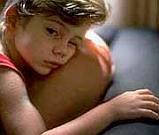"Spare the rod, spoil the child," is a philosophy still widely practised by most Czech parents. Studies carried out by the Centre of Preventative Medicine at Charles University suggest that ten years ago 90 percent of children had experienced some kind of corporal punishment at home, and that the number has hardly fallen since.
"The drop of four percent is not statistically significant, but we are very pleased by the result because it shows that Czech society is becoming more sensitive to all forms of violence."
Dr Eva Vanickova from the Department of Children's and Youth Health at the Centre of Preventative Medicine at Charles University was in charge of two studies carried out in 1994 and 2004. In both cases 1000 ten-year-olds were questioned, with their parents' consent, about the ways of punishment used in the home. Dr Vanickova says that at this age, children aren't ashamed to admit their parents beat them. On the contrary, they enjoy discussing the details of corporal punishment, such as how many wooden spoons their mothers have broken beating them.
Few people realise that using objects to hit a child qualifies as torture. So does hitting the child on a sensitive part of the body and leaving a visible mark on the child's body.
"Ten years ago one third of the children asked admitted their parents practiced such violent punishments. Now it is only 25 percent. I believe this significant decline occurred thanks to a broad debate in the media. Parents are beginning to understand that they should not use violence against their children."
Dr Eva Vanickova says that parents would maybe think twice if they knew how ridiculous they look when they are hitting a child. A slap on the head or face remains the most common type of corporal punishment in the Czech Republic. Ten years ago the most typical tools used by parents were wooden spoons and belts. Now the most common instruments are dog leads and TV cables.
"The majority of our society sees physical punishment as a common part of child rearing. Many parents cannot even imagine a different type of punishment, often because they themselves were brought up that way. And because they think they were brought up well, they don't see why they should change their view on corporal punishment."
Studies suggest that people who experienced violence in the home as children tend to use it as parents in later life. As Dr Vanickova says, the roots of all violence in society, including cruelty to seniors, for example, can often be traced back to the family. That's why, she argues, institutions such as schools, should educate children as well as adults on the unacceptability of violence in the upbringing of children and the importance of respect to other human beings.
Source: Cesky Rozhlas www.radio.cz/en/article/56912




